|
|
|
Sort Order |
|
|
|
Items / Page
|
|
|
|
|
|
|
| Srl | Item |
| 1 |
ID:
172933
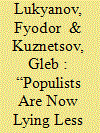

|
|
|
|
|
| Summary/Abstract |
Is the topic of populism relevant to modern Russia? Can our conditions
produce the phenomenon that is currently observed in Europe and the
United States, and is generally spreading around the world? And is it
not time to abandon the model based on political parties? These issues
were discussed at a roundtable held in the office of the Russia in Global
Affairs journal and attended by Yuri Vasilyev, Gleb Kuznetsov,
Vitaly Leibin and Oleg Kharkhordin. Fyodor Lukyanov, Russia in
Global Affairs editor-in-chief, moderated the discussion.
|
|
|
|
|
|
|
|
|
|
|
|
|
|
|
|
| 2 |
ID:
136121


|
|
|
|
|
| Summary/Abstract |
The events of this year have raised questions about fundamental concepts of international relations – War and Peace, the State, and International Law. These reflections evoke an especially philosophical mood in contrast to what is happening in world politics today, where all actors obviously lack a long-term vision and strategy.
|
|
|
|
|
|
|
|
|
|
|
|
|
|
|
|
| 3 |
ID:
112956
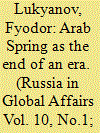

|
|
|
|
|
| Publication |
2012.
|
| Summary/Abstract |
The Arab Spring has entered its second year, and the course of events has vividly proved the predictions of analysts. The process, which started quite accidentally in Tunisia in December 2010, has triggered fundamental changes. These changes will transform the political landscape of the Middle East and make people take a new look at the world. The era, which opened with the fall of communism and the disintegration of the Soviet Union 20 years ago, is over, and a new era is unfolding before our eyes. The essence of the new era is yet unclear. There are more unknown than known variables in this equation for Russia and the rest of the world.
|
|
|
|
|
|
|
|
|
|
|
|
|
|
|
|
| 4 |
ID:
148715


|
|
|
|
|
| Summary/Abstract |
Twenty-five years have passed since the Cold War, but no stable international order has been created. The idea about a Western-centric unipolar world has failed, and a multipolar system is yet to emerge, though it’s hard to comment on how it may function properly.
|
|
|
|
|
|
|
|
|
|
|
|
|
|
|
|
| 5 |
ID:
165651


|
|
|
| 6 |
ID:
157237
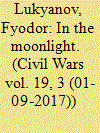

|
|
|
| 7 |
ID:
157238


|
|
|
|
|
| Summary/Abstract |
Three years ago, when everyone commemorated the World War One centenary, Christopher Clark's The Sleepwalkers topped the best-seller list. The book describes how the leaders of great powers, consumed with vanity and ambitions but not actually seeking confrontation, plunged Europe into a senseless massacre. It destroyed the world order and caused instability that lasted over three decades and included a new world war.
|
|
|
|
|
|
|
|
|
|
|
|
|
|
|
|
| 8 |
ID:
143113


|
|
|
|
|
| Summary/Abstract |
"Fifty years ago the streets of Leningrad taught me a lesson: if a fight is inevitable, hit first." These words by Vladimir Putin have become a most quoted phrase of the past fall. Said at the Valdai International Discussion Club, it unambiguously conveys the underlying principle of Russia's current foreign policy. As Sergei Minasyan writes in his article, this is the second time the Kremlins abrupt and large-scale military-political actions have caught everyone off guard. In his opinion, the Middle East will most likely be the focal point of Russia's activities in the coming - and probably long - period.
|
|
|
|
|
|
|
|
|
|
|
|
|
|
|
|
| 9 |
ID:
147724


|
|
|
|
|
| Summary/Abstract |
The future and the past can meet sometimes--when the present is at an impasse, like it is today. For a quarter of a century now, we have been tirelessly building a new world order, but suddenly time seems to have rolled back, reviving the talk of a new Cold War, an ideological conflict, arms control, and nuclear confrontation.
|
|
|
|
|
|
|
|
|
|
|
|
|
|
|
|
| 10 |
ID:
147030


|
|
|
|
|
| Summary/Abstract |
Life is never dull. The results of the British referendum, hardly expected by anyone, came as a new wake-up call clearly signaling that there is not a place left on Earth where politics could be predictable. Now everyone is waiting with bated breath for the outcome of the presidential election in the United States where all think that Donald Trump simply cannot win, but are no longer certain.
|
|
|
|
|
|
|
|
|
|
|
|
|
|
|
|
| 11 |
ID:
146255
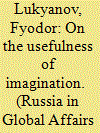

|
|
|
|
|
| Summary/Abstract |
The hackneyed saying "It's tough to make predictions, especially about the future" is as relevant today as never before, but there is no stopping to the audacious flight of imagination. Popular as it is, extrapolation of current trends to future periods does not work as something always gets in the way, while attempts to draw a completely different picture look like imaginative writing. And still we have taken the risk. Interestingly, Yevgeny Kuznetsov's futurological view based mainly on technological aspects does not seem to be at odds with present-day sociopolitical tendencies. In other words, technological breakthroughs do not change the general vector of global development but rather accelerate it.
|
|
|
|
|
|
|
|
|
|
|
|
|
|
|
|
| 12 |
ID:
132697
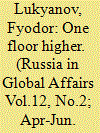

|
|
|
|
|
| Publication |
2014.
|
| Summary/Abstract |
It is already becoming habitual: yet another turn in world politics - and a fondly prepared portfolio of materials has to be shelved, and new ones made in an emergency mode. Witnessing epoch-making events is fascinating, but it takes a lot of nerve…
The period from February to April 2014 marked the sharpest turn in history since the end of the Cold War. We have witnessed the actual collapse of the Ukrainian statehood which emerged after the abolition of the Soviet Union, Crimea's entry into the Russian Federation, and an upsurge in confrontation between Moscow and the West. No wonder life made us revise our plans and devote the entire issue of Russia in Global Affairs to the changes which someone has already dubbed "Russian spring."
|
|
|
|
|
|
|
|
|
|
|
|
|
|
|
|
| 13 |
ID:
118596
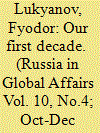

|
|
|
|
|
| Publication |
2012.
|
| Summary/Abstract |
Russia and the United States are trying hard to assure each other of their commitment to common goals and values. A nascent democracy is emerging in Afghanistan under the responsive guidance of the coun-terterrorist coalition. The Arab community is debating the causes of stagnation and lagging development. The European Union is poised to become a global leader as Europe's expanding and intensifying integration enters a decisive phase...
|
|
|
|
|
|
|
|
|
|
|
|
|
|
|
|
| 14 |
ID:
151536


|
|
|
|
|
| Summary/Abstract |
No matter what numerous political opponents and rivals, the liberal press, Hollywood stars, European leaders, minorities, and high-brow experts think of this man with dyed hair, the phrase "President Trump" will become one of the buzz words in world affairs in the years to come (and certainly during the next four years). Donald Trump is not a contingency or an alien that has come from Mars or Alpha Centauri to blow up the habitual earthly politics.
|
|
|
|
|
|
|
|
|
|
|
|
|
|
|
|
| 15 |
ID:
144605


|
|
|
|
|
| Summary/Abstract |
In February, Moscow and Washington issued a joint statement announcing the terms of a “cessation of hostilities” in Syria [1]—a truce agreed to by major world powers, regional players, and most of the participants in the Syrian civil war [2]. Given the fierce mutual recriminations that have become typical of U.S.-Russian relations [3] in recent years, the tone of the statement suggested a surprising degree of common cause. “The United States of America and the Russian Federation . . . [are] seeking to achieve a peaceful settlement of the Syrian crisis with full respect for the fundamental role of the United Nations,” the statement began. It went on to declare that the two countries are “fully determined to provide their strongest support to end the Syrian conflict.”
|
|
|
|
|
|
|
|
|
|
|
|
|
|
|
|
| 16 |
ID:
156367


|
|
|
| 17 |
ID:
143124
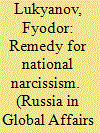

|
|
|
|
|
| Summary/Abstract |
Fyodor Lukyanov talks with Alexei Miller, a Professor of History at the European University in St. Petersburg and Central European University in Budapest, about the role of history in politics today
|
|
|
|
|
|
|
|
|
|
|
|
|
|
|
|
| 18 |
ID:
084654


|
|
|
| 19 |
ID:
095899


|
|
|
|
|
| Publication |
2010.
|
| Summary/Abstract |
When Vladimir Putin described the breakup of the Soviet Union several years ago as "the greatest geopolitical catastrophe" of the 20th century, his words triggered a strong reaction in the West and among Russia's neighbors. They sensed that the Russian president's words held not only nostalgia for the now-vanished great power but also hidden imperial ambitions. Indeed, Russia's political class of the late 20th and early 21st century is overcoming its post-imperial syndrome with difficulty. This phenomenon is not unique-many European empires faced the same problem in the 20th century. In Russia's case, the situation is compounded by the fact that the country's disintegration meant the loss of territories that had never been viewed as colonies but had been seen as a natural part of the country's historical and cultural core. For the first time in history, the Russian people have become a divided nation. After the Soviet Union ceased to exist, 25 million ethnic Russians found themselves living outside the Russian Federation, which could not but have an impact on the policies of Moscow and the other newly independent states.1 At the same time, Putin's words also carried a deeper meaning that few people noticed.
|
|
|
|
|
|
|
|
|
|
|
|
|
|
|
|
| 20 |
ID:
092995
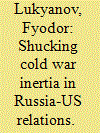

|
|
|
|
|
| Publication |
2009.
|
| Summary/Abstract |
Obama's declared approach of taking account of the views of other countries, reliance on multilateral institutions and consensus diplomacy will help to reshape Russian--US relations. The recent dialogue on strategic offensive armaments could well be the spark that will ignite the engine of Russian--American interaction on a wide range of issues. It is increasingly clear, however, that ideologies and nuclear arms will not be the driving forces of world politics in the 21st century. Under these circumstances, Russia can be either an opponent or a partner for Washington. Previously, the main problem in their relationship was the US' unwillingness to sacrifice any of its interests, even secondary ones. A new Russian--US partnership could be built on the similarities in their foreign policy priorities - their focus on regional conflicts and the need for stability in Eurasia.
|
|
|
|
|
|
|
|
|
|
|
|
|
|
|
|
|
|
|
|
|